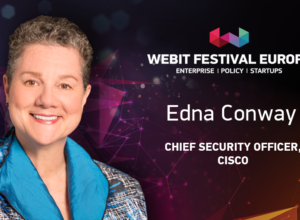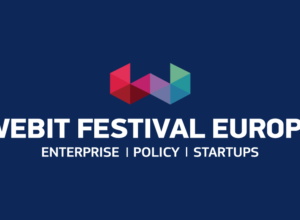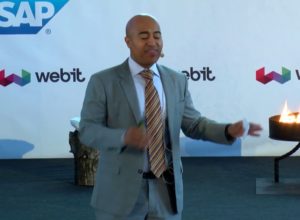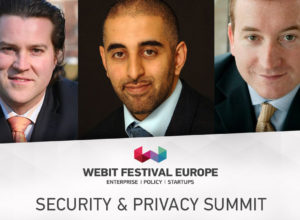Tag: Privacy
Chief Security Officer of Cisco – Edna Conway joins Webit this...
Here you can see a full list of the confirmed speakers at Webit.Festival Europe 2018, while here you can get all the information you need about the tickets for the event. Managing supply chain risk requires a comprehensive approach over the complete product or process life cycle, and Cisco is looking at the potential impact of new technologies such as blockchain and the “internet of things” as part of its solution.Digitization is driving each of us across all industries to make dramatic changes to how we approach customers, products, services, and the always-on, real-time information rich marketplace. This digital economy is gender agnostic. And, it is highly dependent on a connected global ecosystem. The message is clear—no one person, enterprise, industry, government or region can stand alone any longer.
Prior to Cisco, Conway was a partner in an international private legal practice and served as Assistant Attorney General for the State of New Hampshire.“We define the value chain as the end-to-end life cycle for any solution. In order to build trust, you need to understand the risks you are taking, and those risks need to be measured in the language of business.” says Conway
She is recognized domestically (US Presidential Commissions) and globally (NATO) as the developer of architectures delivering value chain security, sustainability and resiliency. Her insight is featured in a range of publications, analyst reports, and case studies, including Forbes, Fortune, Bloomberg, CIO Magazine and the Wall Street Journal. Conway is constantly using her expertise to leverage new tools in an ever-expanding digital arsenal. She has turned her attention to the security potential in blockchain. With the ability to track data through networks, blockchain becomes a highly effective digital ledger, or “passport for the data” according to her.My path to security was built on a foundation of protecting intellectual property; enhanced by a legal background and rich engineering and operational leadership roles afforded to me by Cisco. Each of these opportunities, including leaving a successful legal practice to join Cisco, required faith. Faith in my own ability to learn an entirely new discipline and trust that my colleagues would support me in that effort.
Recognition of her industry leadership includes membership in the Fortune Most Powerful Women community, and awards including: a Fed 100 Award, Stevie “Maverick of the Year Award,” a Connected World Magazine “Machine to Machine and IOT Trailblazer” Award, an SC Media Reboot Leadership Award, a New Hampshire Tech Professional of the Year 2018 Award, and CSO of the Year Award at RSA.“A chain of custody of your data and your actions across the full spectrum of a life cycle adds a degree of integrity we’ve never had the ability to do easily before”
Only today! 50% off from all tickets for Webit.Festival Europe 2018!
Register here and get your ticket
to join Prime Ministers, EU Commissioners and EU top policy makers, global innovators and enterprise executives, Ministers, Mayors, investors, media and Europe's top 200 startups and scaleups - all at Webit.Festival Europe with a special discount of 50% on all tickets with code: GDPR 6000 global experts (67% senior attendance) join Webit from 110 countries.Check who is speaking
Over 200 exhibitors and sponsors join Webit this year. A warm welcome to the group of new partners who join Webit including Microsoft, SAP, Samsung, Fox, Novartis, VISA, UBB, part of KBC Group, Superhosting . BG, VMware, FOX, Turner, Novartis, Bayer, Amgen, Generali to name a few. Special thanks to our General partner MasterCard and our strategic media partners Nova TV and NetInfo.Happy to help.
Should you want to join as exhibitor and sponsor - please contact us.We’ve updated our Privacy Statement
There is so much buzz around the new EU’s General Data Protection Regulation (GDPR)
At Webit we are firmly committed to privacy and data protection and we are happy to confirm that we, too, have taken all necessary steps to ensure [full] compliance with the GDPR. All necessary controls and features are in place so you can continue to use our service with confidence.
Feel free to check out our updated Privacy Statement to understand more about the types of information we may collect, how we use it, and why we request it.
Webit is all about community and empowering your success through connecting you with potential partners, investors and clients from all around the world.
SPECIAL 50% DISCOUNT
We also want to take this opportunity to let you know that Webit is welcoming this new era of data privacy by providing all our subscribers a special "DATA present” 50% off from all tickets for Webit.Fetsival Europe 2018 starting this Friday, 25 May till 29 May.
We release a total of 250 tickets for this special "DATA Present".
Register here
and join Webit.Festival Europe with a special discount of 50% on all tickets with code: GDPR
We collect personal data when you register with us via our website or when participating in our events, exchange personal contacts, etc. We will use your personal information to provide and further improve our services, to ensure the security of our website and information systems, as well as for fraud prevention. We do not share it with other companies or organizations. We send to our customers, partners, participants in our events, subscribers and community our information bulletin about the upcoming events, promotions and free tickets, latest developments, new technologies, meetups, parties, products and services, etc.
Privacy, Security and Internet of This, That & Tomorrow
Travis LeBlanc, former Chief of Enforcement Bureau at the Federal Communications Commission
Free Internet access - a thing available at the click of a mouse or a tap on a screen for most people. But in the not so far future this wasn’t the case. An open and free Internet access still isn’t the case in a number of countries around the world. Though the UN has proclaimed Internet access as a human right.Privacy, Security and Internet of This, That & TomorrowNowadays almost all newly launched companies rely heavily on the Internet ecosystem
This trend carries numerous possibilities with it, combined with numerous unknowns too. The number of connected devices is constantly increasing. This includes not only our smartphones but any IoT devices ranging from connected vehicles through surveillance systems to our hairbrush. The IoT boom certainly provides benefits - creating smart devices, managing energy efficiency, forecasting needed repairs or whatever need it is. But at the same time carrying a number of threats with it. There have been cases as hackers obtaining personal data from institutions, taking control on connected cars and even being able to reach to a person’s pacemaker. All this serves as an example reminding us how insecure the devices we so heavily rely on are. Three years ago, the Federal Communications Commission has issued regulations to prevent broadband Internet service providers from controlling the access that consumers have to the Internet, from choosing which websites and apps we can use - basically, from choosing the winners and losers on the Internet. It has also taken measures in order to protect broadband privacy, to ensure that consumers know what particular information about them is collected from these providers, what do they do with it and to prohibit them from selling the consumers’ information without their consent.Recently though, these regulations have been reversed
Service providers are able to sell consumers’ information such as browsing history, apps downloaded, location, etc. to the highest bidder, be it the government, marketers or certain bad actors. That is enough scary of a concept by itself, having in mind how much information is contained in the smart devices we use daily. Governments and regulators should proceed from the point that everything can be hacked. At some point, it’s very likely to happen and prompt measures need to be taken to prevent or at least minimize the harm. This concerns all companies creating products and services for the market. Security and privacy issues need to be considered from the start of developing a certain product. They should not be left for figuring out after the process has finished and the damage has already been done. If you want to stay tuned with evolving security & privacy matters, the Webit.Festival 2018 in Sofia gathers some of the world’s pioneers on the subject.Confidential documents leak threatens consumer trust in smart devices
The famous whistleblower also noted that CIA is not hacking apps like Signal, Telegram and WhatsApp, but the whole iOS and Android operating systems. To learn more on the topic of cyber security and privacy, visit the Security & Privacy Summit within Webit.Festival. During 25th and 26th April 2017 in Sofia top level speakers from all over the world will share their experience in this important field. You can listen to experts like Ulrich Seldeslachts, CEO of LSEC-Leaders In Security, the CTO of Intel Security for EMEA Raj Samani and the Co-Founder of Distil Network Rami Essaid.PSA: This incorrectly implies CIA hacked these apps / encryption. But the docs show iOS/Android are what got hacked - a much bigger problem. https://t.co/Bw9AkBpOdt
— Edward Snowden (@Snowden) March 7, 2017
Find out how to bring your Security & Privacy to the...
Blockchain can reshape the world if it deals with its security...
Finding the right balance between privacy and security online
Webit speakers: Aurelie Pols, Digital Analytics
 Of International background she was Globalization Chair for the Digital Analytics Association (DAA) and serves on the Board of Stockholm’s eMetrics Marketing Optimization Summit.
Today she speaks at various events such as eMetrics, O'Reilly's Strata and the IAPP, The International Association of Privacy Professionals.
After a decade of gathering technical knowledge about the use of analytics tools through a range of certifications, she focuses on delivering value to the bottom line with keeping an eye on data protection legislation, pushing a Privacy by Design agenda.
Her main focus, besides coaching analysts and data officers, are data integrations and vizualizations; digital analytics teams with their HR set-up & Privacy within the context of Big Data.
She will be presenting her experience and knowledge at the blue track of the Global Webit Summit. The topic that she will be presenting is: "Assessing Risks in the Cloud to fuel Big Data Initiatives".
Join the discussion at the 6th Global Webit Congress in Istanbul. Come join Aurelle Polls and over 200 distinguished speakers at the Global Webit Congress. Book your ticket now.
Of International background she was Globalization Chair for the Digital Analytics Association (DAA) and serves on the Board of Stockholm’s eMetrics Marketing Optimization Summit.
Today she speaks at various events such as eMetrics, O'Reilly's Strata and the IAPP, The International Association of Privacy Professionals.
After a decade of gathering technical knowledge about the use of analytics tools through a range of certifications, she focuses on delivering value to the bottom line with keeping an eye on data protection legislation, pushing a Privacy by Design agenda.
Her main focus, besides coaching analysts and data officers, are data integrations and vizualizations; digital analytics teams with their HR set-up & Privacy within the context of Big Data.
She will be presenting her experience and knowledge at the blue track of the Global Webit Summit. The topic that she will be presenting is: "Assessing Risks in the Cloud to fuel Big Data Initiatives".
Join the discussion at the 6th Global Webit Congress in Istanbul. Come join Aurelle Polls and over 200 distinguished speakers at the Global Webit Congress. Book your ticket now. 







